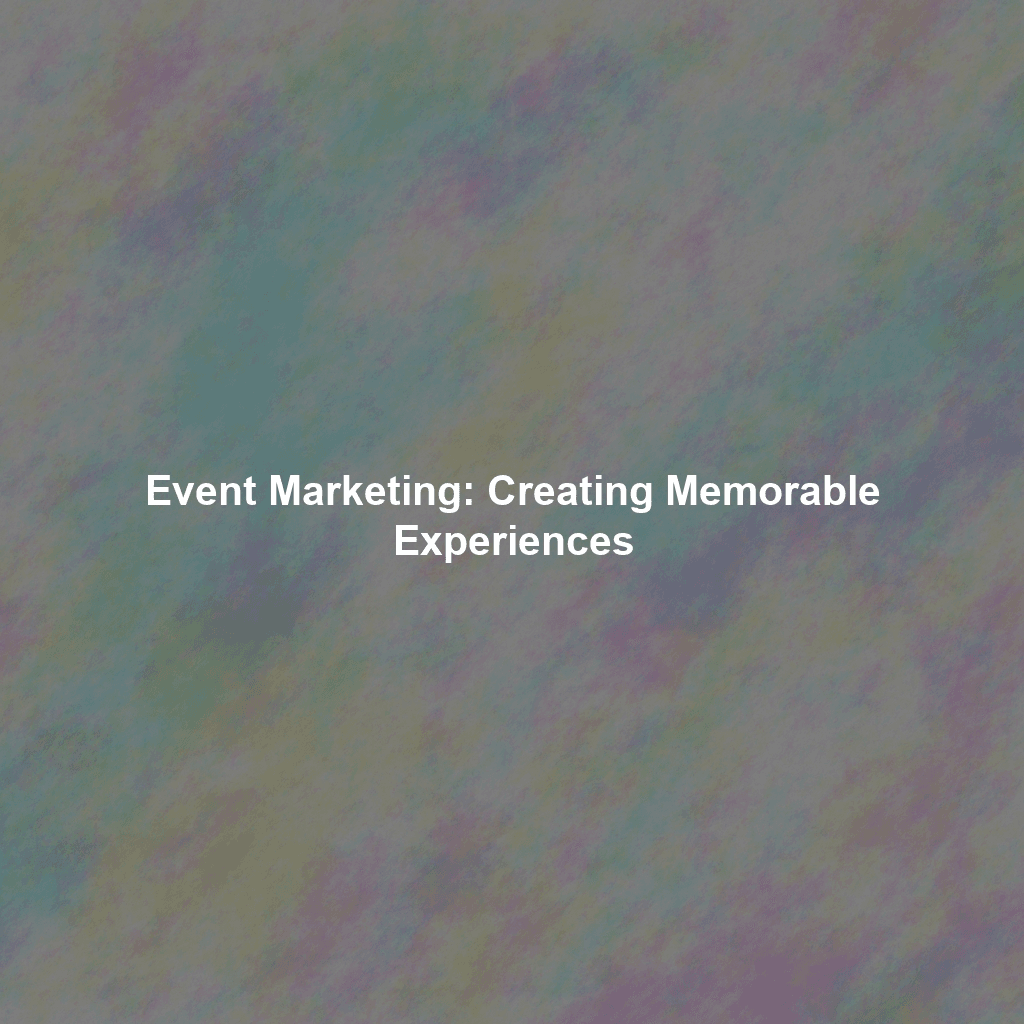In today’s digital age, it’s easy to overlook the power of real-world connections. However, event marketing offers a unique opportunity to build relationships, boost brand awareness, and drive sales through engaging, in-person (or virtual!) experiences. When done right, event marketing transcends a simple gathering; it creates lasting memories and strengthens the bond between your brand and your audience. This article explores how to plan and execute successful events that truly resonate with your target audience.
Why Event Marketing Matters
Event marketing goes beyond just throwing a party. It’s a strategic marketing tactic that can deliver significant benefits for your business:
- Brand Awareness: Events put your brand front and center, exposing it to a wider audience.
- Lead Generation: Capture valuable leads by engaging with potential customers in a meaningful way.
- Customer Engagement: Foster deeper connections with existing customers by offering unique and interactive experiences.
- Product Launches: Showcase new products or services in an exciting and memorable environment.
- Sales Boost: Drive sales directly through event promotions and on-site purchasing opportunities.
- Thought Leadership: Position your brand as an industry expert by hosting or participating in relevant conferences and workshops.
Planning a Successful Event: The Foundation for Memorable Experiences
Careful planning is crucial for a successful event. Here’s a breakdown of the key steps:
Define Your Goals and Objectives
What do you want to achieve with your event? Increase brand awareness? Generate leads? Drive sales? Clearly defining your goals will guide every decision you make throughout the planning process. Make these goals SMART (Specific, Measurable, Achievable, Relevant, and Time-bound).
Identify Your Target Audience
Who are you trying to reach? Understanding your target audience’s demographics, interests, and preferences is essential for creating an event that appeals to them. Consider their pain points and how your event can provide solutions or value.
Choose the Right Event Format
There are many different types of events to choose from, each with its own strengths and weaknesses. Consider your goals, target audience, and budget when selecting the right format. Common event formats include:
- Conferences: Ideal for sharing information and networking.
- Workshops: Hands-on learning experiences that provide practical skills.
- Trade Shows: Opportunities to showcase products and services to a targeted audience.
- Product Launches: Create buzz and excitement around new offerings.
- Webinars: Virtual events that are cost-effective and accessible.
- Experiential Events: Immersive experiences designed to engage the senses and create lasting memories.
Set a Realistic Budget
Event planning can be expensive, so it’s important to set a realistic budget and stick to it. Consider all potential costs, including venue rental, catering, marketing, entertainment, and staffing.
Choose the Perfect Venue (or Platform for Virtual Events)
The venue (or virtual platform) sets the stage for your event. Choose a location that is accessible, visually appealing, and equipped to handle your event’s needs. For virtual events, ensure your platform is reliable, user-friendly, and offers interactive features.
Create a Compelling Event Program
The content and flow of your event program are critical to keeping attendees engaged. Develop an agenda that is informative, entertaining, and relevant to your target audience. Consider incorporating interactive elements such as Q&A sessions, polls, and group activities.
Executing a Flawless Event: Bringing Your Vision to Life
Once you’ve planned your event, it’s time to execute it flawlessly:
Promote Your Event Effectively
No one will attend your event if they don’t know about it! Use a variety of marketing channels to promote your event, including social media, email marketing, website banners, and paid advertising. Tailor your messaging to your target audience and highlight the benefits of attending.
Manage Logistics Seamlessly
Pay attention to every detail, from registration and check-in to catering and technical support. Ensure that everything runs smoothly so that attendees can focus on enjoying the event. For virtual events, provide clear instructions and technical assistance to participants.
Engage Your Attendees
Encourage interaction and networking among attendees. Facilitate conversations, provide opportunities for feedback, and make sure everyone feels welcome and valued. For in-person events, consider interactive games or activities. For virtual events, use breakout rooms, chat features, and live polls.
Gather Feedback and Follow Up
After the event, collect feedback from attendees to gauge their satisfaction and identify areas for improvement. Send thank-you emails, share event highlights, and follow up with leads to nurture relationships and drive sales.
Measuring Event Success: Quantifying the Impact
It’s important to measure the success of your event to determine whether it met your goals and objectives. Track key metrics such as:
- Attendance: How many people attended your event?
- Lead Generation: How many leads did you generate?
- Website Traffic: Did your event drive traffic to your website?
- Social Media Engagement: How much social media buzz did your event generate?
- Sales: Did your event result in increased sales?
- Attendee Satisfaction: How satisfied were attendees with the event?
By analyzing these metrics, you can gain valuable insights into what worked well and what could be improved for future events.
Creating Memorable Experiences: The Key to Lasting Impact
Ultimately, the goal of event marketing is to create memorable experiences that leave a lasting impression on attendees. By focusing on providing value, fostering connections, and engaging the senses, you can create events that not only achieve your business objectives but also strengthen the bond between your brand and your audience.
Conclusion
Event marketing, when executed strategically, is a powerful tool for building brand awareness, generating leads, and fostering customer loyalty. By carefully planning, flawlessly executing, and diligently measuring results, you can create events that not only meet your business goals but also leave a lasting, positive impression on your target audience. Embrace the power of experience, and watch your brand thrive.
 Skip to content
Skip to content

